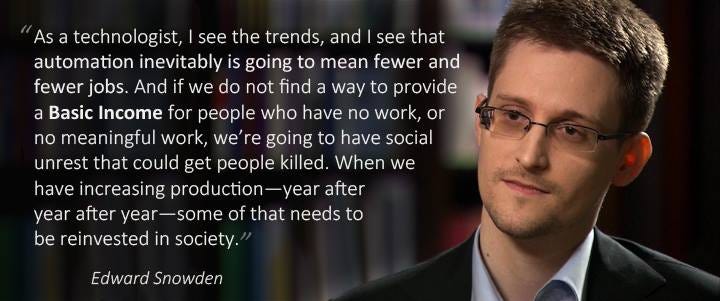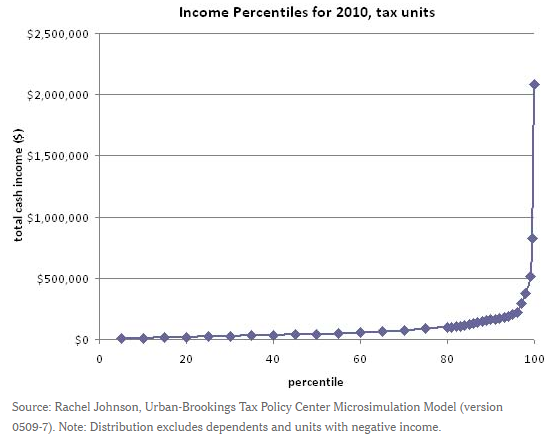John Oliver, Edward Snowden, and Unconditional Basic Income

How all three are surprisingly connected
In what is arguably the most important piece to come out of John Oliver’s “Last Week Tonight” show on HBO so far, John tackles the subject of government surveillance and does so in a way that is guaranteed to win awards in the near future. Here is the historic segment.
Now, you may have just noticed it’s 33 minutes long and have decided to read on instead of stopping to watch it, but I urge you to just take the time to watch it. If you absolutely must save time, at least click to about the halfway point and watch the second half before continuing.
All done?
Okay, now that you’ve been washed in the cleansing waters of creative genius, there are a few very important points I’d like to stress.
Point 1: This Conversation is Really Important
The conversation opened up to the world by Edward Snowden and now creatively re-framed by John Oliver is one of the most important conversations to be having in any even remotely functioning democracy. Unfortunately, it is also a conversation so big, and so hard to wrap our heads around without sufficient knowledge of the dirty details of our present state of technological growth and government “oversight”, that it absolutely requires proper framing that makes it more easily understandable for everyone — no voting citizen excluded.
John Oliver and team recognized this need and have now done something about it. By making it truly personal through changing the conversation from one about privacy to one about privates, everyone can better understand that what is going on right now affects everyone intimately. Our surveillance programs are not only about extremists in foreign lands. They are about us. They are copying our emails. They are recording our voices. They are noting our associations. They are following our every move.
And they are looking at our privates.
This is about your privacy and your rights, just as it is about mine and everyone else’s. And because it’s our government doing this to all of us, it is entirely up to us as the voting public to have the discussion about finally reigning it in to at least some degree, or just resigning ourselves to being okay with all of it for the comforting illusion of increased safety.
This conversation needs to be had. And for this to happen, everyone needs to understand it better. The key problem in understanding it however, is its hugely technical nature. That’s an exceedingly large obstacle, and it brings us to the second hugely important point and how it directly relates to the topic of basic income.
Point 2: Most People Don’t Understand Technology
I propose here that a basic income guarantee and government surveillance are alike, in that they are both extremely important conversations we need to be having as a direct result of our advancing technology.
Technology has reached a point where we’re all walking around with tiny touchscreen supercomputers in our pockets, and yet at the same time, we mostly all have no idea how they work, how to fix them when they break, what they do, when they do it, and what they have replaced by all the ways in which they can be used and by whom.
Did you know it’s possible for someone to hijack your smartphone’s microphone or camera and record you without your knowing? Well, it is.
Did you know it’s possible for someone to hack the systems within your car, while you’re driving it, and take control of your vehicle’s key navigation systems? Well, it is.
Did you know that new companies like Tesla Motors only need a fraction of the employees of yesteryear’s Ford Motor Company (10,000+ vs. 200,000+), Instagram a fraction of yesteryear’s Kodak (13 vs. 145,000), and WhatsApp a tiny fraction of yesteryear’s AT&T (55 vs. 1 million)? Because, they do.
Did you know new companies like Uber, Airbnb, Homejoy, and TaskRabbit don’t even really have (and decreasingly need) employees while directly competing against taxi, hotel, maid service, and just about any other companies that do? Because, they don’t.
Did you know that bots in the form of both hardware and software are no longer purely elements of science fiction stories, that they actually exist, are actively taking jobs in the labor force, and are playing a big role in most all of our jobs paying less and offering less security while simultaneously increasing income and wealth inequality by mostly enriching the few at the top at the expense of the many? Because, they are.
Did you know our economy is 70% based on consumption, and that hardware and software bots neither get paid nor buy the goods and services they are producing for humans increasingly less able to be consumers in a quickly approaching future of self-driving cars and Watsons where Humans Need Not Apply?
All of this should be more alarming to people in the same way government surveillance should be more alarming to people. It’s all happening and we aren’t really talking about it yet to anything close to the degree we should.
Well guess who, because of his technical knowledge, is fully aware of all of the above and the inherent dangers it represents to us?
Edward Snowden.

As a technologist, I see the trends, and I see that automation inevitably is going to mean fewer and fewer jobs. And if we do not find a way to provide a basic income for people who have no work, or no meaningful work, we’re going to have social unrest that could get people killed. When we have increasing production — year after year after year — some of that needs to be reinvested in society. — Edward Snowden
Why Edward Snowden sees both problems and the need for discussing both government surveillance and a basic income guarantee is important to know.
If you keep up with technology, you are more likely to see the importance in implementing a basic income, because you recognize our present state of technology and can see the problems the ongoing trends will create if we don’t have a conversation about it and change some of our policies, just as you’ll be more likely to recognize the need to do the same in regards to government surveillance.
If you don’t keep up with technology, if you give it little thought and just use it or don’t use it — which tends to be most people — you are far less likely to see any need to have any discussion at all about basic income, or to enact any policies in recognition of fully structural technological unemployment.
Among those of us who are technologically-minded, many do see the importance, and are trying hard to get everyone else to see it as well. However, this message is extremely challenging to convey for the same reason that was demonstrated to Ed Snowden so effectively by John Oliver, and it goes beyond a lack of technical understanding.
The primary challenge to both conversations is the plain and simple (and somewhat depressing) fact that we as humans don’t tend to really listen about much of anything, unless it immediately and directly affects us instead of those we don’t know. This is absolutely vital to recognize.
Point 3: We Don’t Care Unless It’s Personal
John Oliver’s central thesis in his piece about government surveillance is that in order for the conversation surrounding it to really advance to the point everyone is talking about it, we should just circumvent understanding barriers by simply getting each other to think about our own naked bodies being looked at and shared by strangers without our explicit permission.
If we do that, instead of our conversations needing to be informed by large amounts of technical know-how to even begin to really comprehend them (like XKeyscore and Prism and all our myriad of other highly technical NSA programs few can easily understand in part let alone as a whole), we really only need to be informed by a single direct and entirely personal effect on us as individuals.
In the case of government surveillance, the conversation then is as simple as asking…
“Do you want strangers looking at your private photos?”
In the case of basic income, the conversation can be as simple as asking…
“Do you want an extra $1,000 per month?”

As long as people think basic income is solely about poverty, and don’t follow advancing technology and its many effects, this incredibly important conversation won’t be had. It won’t be had because people will think it doesn’t really affect them, or if it does, it’ll only raise their taxes. They will think this because everyone thinks they are a member of the middle class, when they aren’t, and that taxes on the middle class will have to increase, which they won’t.
This complex conversation instead needs to be simplified, and I suggest down to the following:
“What will you do with your extra $1,000 per month and $300 for each of your kids?”
This question is even more personal than just asking if someone wants money, because it asks people to think about what they themselves will do with their money, not just money, and also when they get it, not if they get it.
This question also implies we’re discussing the fully universal and unconditional version of basic income, and not the negative income tax variant, because that variant, although identical in outcome, is less personal and therefore potentially suffers from the same problems as already discussed.
What I mean by that is that if we reduce the basic income with earnings (as we would with a NIT), many people will think they won’t personally benefit, in the belief they earn too much to benefit, even though they don’t and assuredly will. If we don’t reduce the basic income with earnings (as we would with a UBI), then everyone will clearly get it.
Unconditional basic income, unlike welfare or food stamps or housing assistance, is fully universal. UBI does not care whether you are rich or poor, or a member of the middle class. UBI only cares if you are a citizen. UBI is a check that everyone will get regardless of anything but right of citizenship.
This is why I feel we need to focus on unconditional basic income, because it is the simpler conversation that is easier to understand in how it will directly affect each and every one of us regardless of present earnings. We all as adults get an extra $1,000 per month and every child gets an extra $300 per month. That’s as simple as it gets. Every legal citizen gets the same amount. You will get that amount. I will get that amount. A billionaire will get that amount. We will all get that amount.
So do you like that idea or do you dislike that idea?
That’s the discussion we need to have. The effects of technology aside, do you want a $1,000 raise whether you work or not? Do you want your kids to be able to eat, whether you are able to find work or not in an economy with more job seekers than jobs?
The question of universal basic income is universally personal.
The next question of how to pay for it is actually a separate discussion, just as it is a separate discussion to figure out just how we should go about balancing our concerns for privacy and our concerns for safety in regards to the details of our government surveillance programs. It doesn’t so much matter how we go about this balancing act, as it matters that we together decide a new balance needs to be found in the first place.
Do we want our dick pics seen by countless strangers without our knowing?
Do we want paychecks regardless of work so we can always afford to survive?
These are two questions we each must find our own answers for, and they are both at the center of two very important conversations we all need to be actively engaging in with each other here in the 21st century, whether we fully understand the incredible rates of advancement and effects of our technologies or not.
Special thanks to Arjun Banker, Topher Hunt, Albert Wenger, Larry Cohen, Danielle Texeira, Paul Wicks, Liane Gale, Jan Smole, Joe Esposito, Robert F. Greene, Martin Jordo, Victor Lau, Shane Gordon, Paolo Narciso, Johan Grahn, Tony DeStefano, all my other funders for their support, and my amazing partner, Katie Smith.
Would you like to see your name here too?

Did you enjoy reading this? Please click the subscribe button and also consider making a monthly pledge in support of my daily advocacy of basic income for all.
_large.jpg)
UBI Guide Newsletter
Join the newsletter to receive the latest updates in your inbox.



